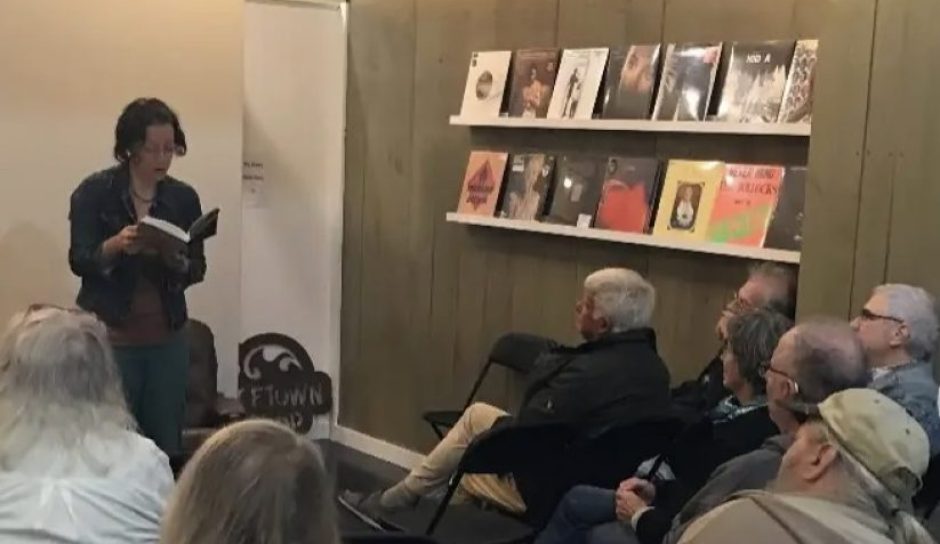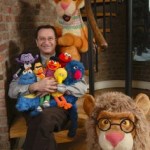 Norman Stiles, Sesame Street head writer from 1971 to 1995, told me that Richard Hunt used to call him “Swami” – and after talking with him for a couple of hours, I can see why. Stiles comes off as a classic trickster guru, making you laugh but also making you think. We spoke about Hunt, Sesame’s halcyon days, what makes good writing, and about Stiles’ new project, The Baby and Toddler Parenthood News Network, in many ways a spiritual descendant of Sesame, in the last days of its Indiegogo campaign. Enjoy!
Norman Stiles, Sesame Street head writer from 1971 to 1995, told me that Richard Hunt used to call him “Swami” – and after talking with him for a couple of hours, I can see why. Stiles comes off as a classic trickster guru, making you laugh but also making you think. We spoke about Hunt, Sesame’s halcyon days, what makes good writing, and about Stiles’ new project, The Baby and Toddler Parenthood News Network, in many ways a spiritual descendant of Sesame, in the last days of its Indiegogo campaign. Enjoy!
Norman Stiles: Richard [Hunt] called me Swami.
Jessica Max Stein: Why? Did you wear a turban?
NS: No. My company at the time was called Swami productions. He thought that was a riot! And so he started calling me Swami.
JMS: Why was it called Swami productions?
NS: Because [in accent] I used to do a Swami accent! I had this whole character, I used to do predictions and all that stuff. I used to do the character, and he would talk to me.
JMS: What was Sesame Street like in the early 70s, when you and Hunt joined up?
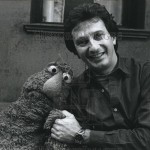 NS: When I got there, Sesame Street was a phenomenon, but it was just in its beginnings. When I started, it was this wonderful thing that was happening, at the same time as Head Start, the War on Poverty, all these initiatives that, surprisingly enough, it seemed the whole society was embracing. So it was a great time to be there, especially if you really believed all that stuff, and I did! It was a great place to work. To be in that atmosphere, with all that creativity, devoted to this common purpose, I don’t think I’ve ever experienced that again!
NS: When I got there, Sesame Street was a phenomenon, but it was just in its beginnings. When I started, it was this wonderful thing that was happening, at the same time as Head Start, the War on Poverty, all these initiatives that, surprisingly enough, it seemed the whole society was embracing. So it was a great time to be there, especially if you really believed all that stuff, and I did! It was a great place to work. To be in that atmosphere, with all that creativity, devoted to this common purpose, I don’t think I’ve ever experienced that again!
JMS: And then by the 80s, it seems [Jim] Henson and [Frank] Oz were working on other projects, so people say Richard and Jerry [Nelson] were holding down the fort.
NS: I think that’s true. We would get Jim and Frank, rarely, they would come back for a couple of weeks. You have apprentices, you have journeymen, you have masters, and Jerry and Richard were the masters.
JMS: There’s some great behind the scenes footage of Richard and Jerry doing the Two-Headed Monster.
NS: I saw that. If you want to know what the atmosphere was like on the set, you just watch that. You see them laughing, you see everybody having a good time. That’s what it was like. They would joke around, they would laugh. There was none of that, ‘Come on, come on!’ It was all considered to be part of the process. Who knows what we’ll come up with?
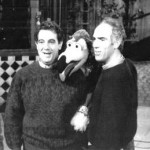 JMS: Speaking of what you came up with, you wrote a bunch of Hunt’s major characters. Did you have him in mind when you wrote Placido Domingo? Did you think, “We’ve got this performer who loves opera and can sing anything you throw at him, so…”
JMS: Speaking of what you came up with, you wrote a bunch of Hunt’s major characters. Did you have him in mind when you wrote Placido Domingo? Did you think, “We’ve got this performer who loves opera and can sing anything you throw at him, so…”
NS: No, it came purely out of wanting to do a parody of Placido Domingo. It was Chris Cerf and I, he wrote the songs. Once we said it, we knew it would be Richard, because he was clearly the person who would play this over the top. And of course it was great.
JMS: You also wrote Forgetful Jones.
NS: Forgetful – I really liked that character, a lot. Richard brought life [to the character] in a way that you can’t quite imagine on the page. It was just pure. The idea was he’s not ever going to get upset with himself, he’s just going to marvel at the fact that he forgot. Nobody gives him a hard time about it. All of that was really important for the teaching aspect of it, because it’s good to have the kids a little ahead of you, and as they’re ahead of you, you’re talking about the power to remember, and you’re giving them strategies for how to remember something if they forget. You can’t ask for anything more than that.
JMS: And he’s so good-natured.
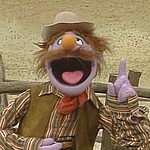 NS: That’s the whole thing. He’s good-natured about himself. People are always beating themselves up over some flaw. And he never beat himself up. That’s just how he was. “I forgot.”
NS: That’s the whole thing. He’s good-natured about himself. People are always beating themselves up over some flaw. And he never beat himself up. That’s just how he was. “I forgot.”
One of my favorite Forgetful Jones pieces that I ever wrote – I’m starting to think about doing some public speaking. The premise is that there were things over and above all that cognitive stuff that you were learning on Sesame Street, that you could use a refresher course in, today, in your adult life.
One of the pieces I want to use is a Forgetful piece with Gordon. It’s to teach how do you remember something if you forget. Gordon comes out of the brownstone, and Forgetful’s standing there, “Hey, ooo.” “Hey, Forgetful! What’s going on?” “I don’t know.” “How you doing?” “I’m happy! I’m happy!” He says, “Why are you so happy?” He goes, “Well, I forget.” He says, “Well, let’s see if we can help you remember. What was going on? Think back. What was happening?” “Well, I was walking down the street, and I could feel the sun on my head.” “That’s good, okay, what next?” “Well, I felt a nice cool breeze blowing. And then my heart started going, ‘Ba-bum, ba-bum, ba-bum.” “Yeah.” “And I said to myself, ‘Wow, I’m happy!’” And he says, “Can you imagine me forgetting all those things that make me happy?”
JMS: It’s a good lesson.
NS: It’s one of my favorite pieces, clearly. It’s one of those things where the message is on the nose. But it’s not on the nose.
JMS: It’s true, adults forget to be happy.
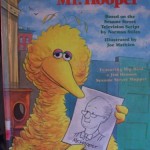 NS: About the little things. There’s a memory I have – it’s not connected to anything – of just walking down Broadway with Richard. Sometimes you have a memory and you don’t have any reason why. It’s a nice memory. Me and Richard walking down the street.
NS: About the little things. There’s a memory I have – it’s not connected to anything – of just walking down Broadway with Richard. Sometimes you have a memory and you don’t have any reason why. It’s a nice memory. Me and Richard walking down the street.
When I first got on the show, I was intimidated by all of the puppeteers.
JMS: Why? You were the writer!
NS: I know, but I was a new writer. I was intimidated by all the writers! I’d never written anything like this before, I’d never written dialogue before, I was a novice. So I really didn’t have any confidence. I thought, Well, I’ll write one more script and then I’ll never be able to write another one. I’ll never have another idea!
As a matter of fact, I once went into Jeff Moss, I’d been racking my brain and my script was due in a day or so, and I said to Jeff, I’m sorry, I have no ideas. He said, You have no ideas? I said, Well, I have some ideas. He said, It’s not your job to judge your ideas. It’s my job to judge ‘em. You write ‘em.
JMS: That’s helpful. You don’t have to worry if it’s any good. Just get it down!
 NS: And that’s what writing should be. The lesson is, Get it down, and then you can look at it afterwards.
NS: And that’s what writing should be. The lesson is, Get it down, and then you can look at it afterwards.
JMS: That’s what I tell my students.
NS: It’s hard, because the way we teach writing is just the opposite.
JMS: It’s product-oriented, not process-oriented.
NS: Right. And people don’t understand that it’s a process, and the process is rewriting.
JMS: And the product is just a byproduct of the process; I did this thing and so I have this thing, as opposed to, Oh God am I done yet, am I done yet, am I done yet.
NS: It’s being in there in the moment while you’re writing, and experiencing it the same way a reader would experience it. I said it’s one of the reasons writers are not paid well, in the beginning. It’s because they think you sit down at your computer and go like this [mimes typing], and you sit for an hour, and then you say, Ahh, okay, think I’ll go and get some lunch. I think that’s what people think.
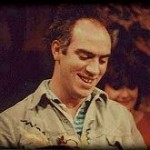 Yeah, Richard was a delightful human being. Delightful. Whatever you saw in Forgetful, that’s him. He’s in there. He’s in Gladys. He’s in Placido. He’s in the Two-Headed Monster. Everything he did. I’ll bet if you played all of them, if you ran them side by side, you’d say, It’s a similar voice in all of them, but you’d also see the same energy, you’d see the same smile. You know how you can hear a smile? You can hear it in all of his work. To me, Richard is a smile.
Yeah, Richard was a delightful human being. Delightful. Whatever you saw in Forgetful, that’s him. He’s in there. He’s in Gladys. He’s in Placido. He’s in the Two-Headed Monster. Everything he did. I’ll bet if you played all of them, if you ran them side by side, you’d say, It’s a similar voice in all of them, but you’d also see the same energy, you’d see the same smile. You know how you can hear a smile? You can hear it in all of his work. To me, Richard is a smile.
JMS: Richard really inspires me. I went out to London to do a bunch of interviews. And if I wasn’t working on this book, I never would have gone. Flying over an ocean, my God, anything could go wrong. But that’s the thing about that little Richard voice in my head, something could go wrong, “So what?” He went all over the place. He and a friend went to Machu Picchu. I’ve been reading about it, what a place!
NS: He was there, he’d say, You be Machu, I’ll be Picchu. Two birds!
JMS: And then there’s this crazy story that Richard went to the Gambia. There was some project, Henson was sitting next to Herbie Hancock on an airplane, sounds like the beginning of a joke, right? So Jim didn’t go, but Martin Baker, and a camerman, and Richard. And pretty late, too, late enough that you would think someone with an immune deficiency would say…
NS: Say, “I’m not going to Gambia!”
JMS: But that’s him. He’s not going to turn down a chance to go to Gambia! He’s not going to think, “Oh no, I can’t go, I have to be careful.” Although he was also careful, of course.
 NS: In order to be a really good improviser – which is one of the things he was good at – you have to be willing to take risks. Not only was he willing to take them, he loved to take them. What you’re doing is you’re letting go of conscious control, of the part of you that’s judging, because that’s what stops every creative enterprise, is a judgment. Internal judgment, that you either put on yourself, or assume others are going to have, or whatever it is. So you just go, and you become free.
NS: In order to be a really good improviser – which is one of the things he was good at – you have to be willing to take risks. Not only was he willing to take them, he loved to take them. What you’re doing is you’re letting go of conscious control, of the part of you that’s judging, because that’s what stops every creative enterprise, is a judgment. Internal judgment, that you either put on yourself, or assume others are going to have, or whatever it is. So you just go, and you become free.
So part of what he was doing was he was also living his life creatively. And that’s another aspect of who he was, how he’s going to live.
Like everybody, you think about the future, you think about the past, all of that. But if you allow yourself to be too preoccupied by what is going to happen if I do this, mapping out the possibilities, making all the plans – well, you can do that ad infinitum, and once you take a step, you’re going to meet something you didn’t expect, and you’re going to have to improvise anyway. So you might as well start out and say, Well, I’m going to prepare as much as I can, but I’m not going to not go.
It’s hard, it’s very hard. It’s not how we’re brought up. We certainly don’t live in a world that values that kind of thing.
JMS: That’s how I felt about London. Before I left, I google-mapped everything I could possibly need: the market, the library, the park, the gym, everything. And a friend said, That’s great, you can go over there and have exactly the same life you have right here, whoop de doo.
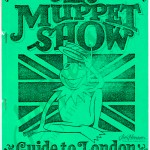 NS: That part is true. But there’s another part of that, that’s also true. You don’t get a chance to discover! That’s the most important part. Because when you’re being creative, you’re discovering something you didn’t expect! You can’t plan for new discovery. There it is!
NS: That part is true. But there’s another part of that, that’s also true. You don’t get a chance to discover! That’s the most important part. Because when you’re being creative, you’re discovering something you didn’t expect! You can’t plan for new discovery. There it is!
JMS: You know, I’m happy to hear you say that. I went to this biography conference last weekend and there was a discussion over whether you should do much writing before you try to sell the book. There was very little room in that discussion for the understanding that you’ll discover things as you write.
NS: If it doesn’t take a twist or a turn, then somebody reading it isn’t going to be surprised.
JMS: Well, but it’s tricky in a biography because they know the ending.
NS: That’s the point! When I often wrote a sketch, I knew what the ending was going to be.
JMS: You didn’t know how you were going to get there?
NS: No! We’re all going to the same place, but we’re all taking different roads.
What you’re going to end up with, is this picture of him. Hopefully, the way you write it, that’s going to be a cohesive, fairly clear picture for people, but it’s going to be from lots of different points of view. You’re going to end up with an impression, from all of these things.
And all I would say is, This is your biography of him, ultimately. Your reader’s going to have your point of view, of the research that you did and the people you interacted with. That’s all you have to care about. And if you treat it that way, then you can’t fail. This is your voyage of discovery. So all you have to care about is what you discover. Write that!
Because that’s all you can do. So if you do it with love and with his spirit behind you and in you, you’ll do it. And you’ll do it well.
JMS: Thank you. Can you talk about your new project?
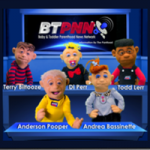 NS: The project is called the Baby and Toddler Parenthood News Network. It’s a parody of a cable news network. We have more baby and toddler puppet news anchors and pundits than any other network in the world! With a very serious purpose, of trying to help parents and caregivers of babies and toddlers to maximize their children’s brain development.
NS: The project is called the Baby and Toddler Parenthood News Network. It’s a parody of a cable news network. We have more baby and toddler puppet news anchors and pundits than any other network in the world! With a very serious purpose, of trying to help parents and caregivers of babies and toddlers to maximize their children’s brain development.
Why this is so important for all babies and toddlers and parents and caregivers is that by the time a child reaches age 3, 85% of the structure of the brain is built. That means that 85% of the structure of the brain that you are using right now to read this, was built when you were age 3.
So that’s why we’re doing the project. We’re hoping to be able to build a library of videos that will be accessible on demand, on smartphones, or stupidphones, and tablets or any other kind of device or computer, so that anyone can access them by searching by title or by the problem they’re having or what they happen to be doing during the day with their babies, and get some information about how they can do little things with their little ones that have big results.
Donate to the campaign here!
